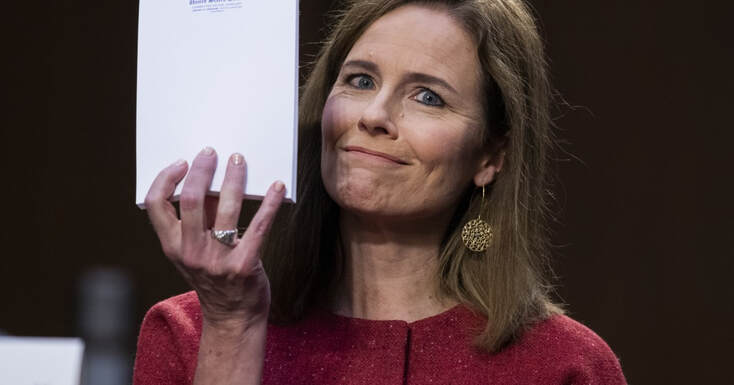blogs about awakening
 As a former trial judge, I was intrigued with the confirmation hearings on Judge Amy Coney Barrett. The more I learn of her background and character, the more impressed I am. Here is a great Wall Street Journal essay on her Christian worldview as she pursues her judicial career and family life in our increasingly secular culture. But, beyond that, I believe that in her testimony before the Senate Judiciary Committee she did an excellent job of describing the difference between the role of a legislature and the role of a judge. Legislatures are the ones who MAKE the law, and judges are the ones who APPLY the law to specific cases. In America, appellate courts also exist to ensure laws passed by legislatures do not conflict with more fundamental laws, including the Constitution. A judge's personal beliefs should NEVER enter into his or her ruling in a given case. That's where we get the picture of the scales of justice held by a blindfolded jurist. (Of course, we shouldn't forget the third area of government: the executive branch, whose role is to ENFORCE and IMPLEMENT laws passed by the legislature.) It's helpful to ask: did our American forefathers simply create these three branches of government out of whole cloth? No, in large part, they got their direction from the Bible. Look at Isaiah 33:22, "For the Lord is our judge [judicial], the Lord is our lawgiver [legislative], the Lord is our king [executive]; it is he who will save us." For God's people of Israel, He represented all three branches of government. While our perfect God can obviously represent all three branches of leadership, we sinful humans need these three functions to be in different entities: for there to be separation of powers. It is true that "power corrupts and absolute power corrupts absolutely." Great mischief develops when one branch of government begins to usurp the role of another branch. We have seen this most clearly in Roe v Wade, the notorious case in 1973 that, in one day, forced all 50 states to accept legal abortion as THE law. In deciding Roe, the Supreme Court acting like a super-legislature, interpreted the words of the 14th Amendment in ways that are truly mind-blowing. Permit me to summarize their legal findings. The due process clause of the 14th Amendment (passed in 1868) says, "nor shall any State deprive any person of life, liberty, or property, without due process of law." In 1973, the Supreme Court ruled that this due process clause REQUIRES a policy of abortion on demand for the entire nation, and that any law to the contrary passed by any legislature was unconstitutional. To which most thinking people say, "What???" One would think that if you can't deprive a person of his or her life without due process of law, abortion should NOT be legal. In my book on the subject, I even quote pro-abortion legal scholars who respond with similar incredulity. But the Supreme Court stated that the 14th Amendment only gives rights to those who are "persons" and, in their judicial wisdom, they concluded that the unborn child is NOT a "person" at least until that child is "viable" if not actually born. However, the pregnant woman IS a person, and you cannot deprive her of her right to "liberty" without due process of law. And, guess what? The Supreme Court said that the woman's right to "liberty" as written in the 14th Amendment includes a woman's right to abortion! (Is there anyone who believes that the authors of the 14th Amendment when passed in 1868 had any sense "liberty" included abortion rights? Not likely!) Yes, our Supreme Court, in one day acting like a super-legislature, struck down laws like those in Michigan which made abortion a crime. So much for courts merely interpreting the law looking at the actual meaning of the words of the Constitution when enacted! To restore governmental balance in America, we need to return to having courts behave like courts should. To paraphrase Judge Barrett: our liberties are better preserved when we as a nation are ruled by laws, not a nation ruled by the passing whims of man. A friend, Bill Federer who writes a daily email called American Minute, recently dealt with this issue of judicial power. In his piece, he quotes author of Democracy in America (1835) Alexis de Tocqueville who warned us saying: --"The President, who exercises a limited power, may err without causing great mischief in the State. --Congress may decide amiss without destroying the Union, because the electoral body in which Congress originates may cause it to retract its decision by changing its members. --But if the Supreme Court is ever composed of imprudent men or bad citizens, the Union may be plunged into anarchy or civil war." Many believe the American Civil War was at least, in part, caused by the Supreme Court's infamous Dred Scott decision in 1857 holding that slaves were not citizens, but property. Abraham Lincoln alluded to this decision in his First Inaugural Address in 1861 in which he said: "The candid citizen must confess that if the policy of the Government upon vital questions affecting the whole people is to be irrevocably fixed by decisions of the Supreme Court, the instant they are made . . . the people will have ceased to be their own rulers, having to that extent practically resigned their Government into the hands of the eminent tribunal." Friends, government is not everything, but it's not nothing either. We are commanded in Scripture to pray for those in authority. We often pray for our President, our Governor and others. But how about praying for the Justices of our Supreme Court and for lower court judges as well? Let's lift them up and ask that they will seek to properly perform their role for the good of our nation, so that we Christ-followers are able to live "peaceful lives in all godliness and holiness." (See I Timothy 2:1-4)
1 Comment
|
Randy HekmanHe is the executive director of The Grand Awakening. Archives
July 2024
Categories |
 RSS Feed
RSS Feed
